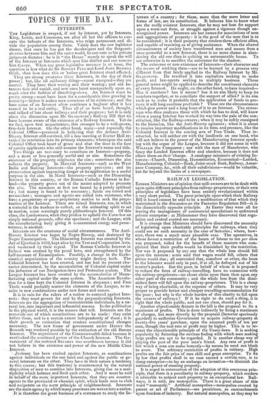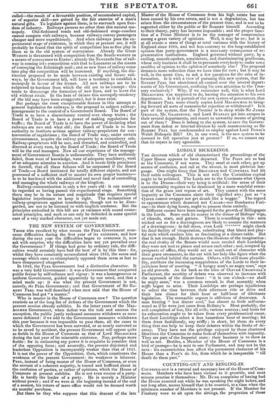RAILWAY LEGISLATION.
EITHER Ministers are of opinion that mill-owners are to be dealt with upon quite different principles from railway-proprietors, or their own principles of legislation have been entirely revolutionized within a very short period. The great principle upon which their Railway Bill is based cannot be said to be a modification of that which they maintained in the discussion on the Factories Regulation Bill—it is the diametrically opposite principle. At Easter they were all for leaving the management of commercial speculations to unfettered private enterprise : at Midsummer they have discovered that regu- lation and central control are necessary.
It is strange that Ministers should have discovered the necessity of legislating upon charitable principles for railways, when they could see no such necessity in the case of factories ; where, how- ever, there was a much more plausible case. The operatives, in whose favour a restriction of the hours of labour to ten per diem was proposed, toiled for the benefit of those masters who corn- plained that their profits would be diminished by the restriction. Nor was it proposed by any one that the whole loss should fall upon the masters : some said that wages would fall, others that prices would rise ; all contended that, somehow or other, the boon to the labourer would only in part, if at all, be defrayed out of his master's pocket. But the poor, in behalf of whom it is proposed to reduce the fares of railway-travelling, have no connexion with the railway-proprietors—no closer claim upon them than upon any other part of the community ; and the whole loss from the dimi- nished fares will fall upon the railway-proprietors. This is a cheap way of being charitable, at the expense of others. It may be very proper to provide better and cheaper travelling-accommodation for the poor ; but why is the whole burden of this charity to fall upon the owners of railways ? If it be right to do such a thing, it is right that the whole public, and not one class, should pay for it. Another objectionable feature in the bill is the proposal to fix a maximum of profits. This is done indirectly by fixing a maximum of charges, but more directly by the proposal (however speciously guarded) to authorize Government to acquire railway-property at twenty-five years' purchase, upon the assumed profit of ten per cent, though the real rate of profit may be higher. This is to re- enact the objectionable principle of the Usury-laws. It is seeking popularity by flattering the envious feeling with which men making large profits are apt to be regarded. It is another cheap way of playing the part of the poor man's friend. Any rate of profit is fair which a man can make honestly—by means he need not blush to avow. The arbitrary restriction of profits is robbery. High profits are the fair price of rare skill and great enterprise. To fix by law that profits shall in no case exceed a certain rate, is to damp enterprise—to lay an embargo on invention—to diminish the national power of creating property.
It is urged in extenuation of the adoption of this erroneous prin- ciple, that there is a peculiarity in railway-property, which renders it advisable to subject such property to an exceptional law. Rail- ways, it is said, are monopolies. There is a great abuse of this word "monopoly." Artificial monopolies—monopolies created by patent or act of Parliament—are pernicious, as encroachments upon freedom of industry. But natural monopolies, as they may be-
called—the result of a favourable position, of accumulated capital, or of superior skill—are gained by the fair exercise of a man's natural gifts. To legislate against them, is to encroach upon free- dom of industry. Railways possess no other than this natural mo- nopoly. Old-fashioned roads and old-fashioned stage-coaches cannot compete with railways, because railways convey passengers cheaper and more expeditiously. And when railways pass the ex- perimental stage of existence, in which they at present are, it will probably be found that the spirit of competition has as free play in them as in the old system of conveyance. Already the Great Western is threatened with competition from the South-western as a means of conveyance to Exeter ; already the Newcastle line of rail- way is coming into competition with that to Lancaster as the means of conveying the Edinburgh mail ; and as new lines of railway come into play the competition will be increased. If anything, the dis- tinction proposed to be made between existing and future rail- ways, by the Government bill, will have a tendency to establish a monopoly in favour of the former. All new railways are to be subjected to burdens from which the old are to be exempt : this tends to discourage the formation of new lines, and to leave the old without rivals. In the heat of debate this monopoly-tendency of the bill may have been exaggerated, but it does exist.
But perhaps the most exceptionable feature in this attempt at general legislation for railways, is the proposal to subject railway- management to the control of a Government Board. The Board of Trade is to have a discretionary control over cheap trains ; the Board of Trade is to have a power of making regulations for traffic ; the Board of Trade is to have the power of declaring what railways are new and what old ; the Board of Trade is to have authority to institute actions against railway-proprietors for con• travention of regulations ; the Board of Trade may, under certain circumstances, acquire the railway property by a compulsory sale. Railway-proprietors will be met, and thwarted, and controlled, and directed at every turn, by the Board of Trade : the Board of Trade will be the real managers. Now all our experience of the manage- ment of Government Boards is unfavourable. They have uniformly failed, from want of knowledge, want of adequate machinery, want of an adequate stimulus to exertion. And it needs little prescience to foretell, that all these failures will be surpassed if the Board of Trade—a Board instituted for totally different objects, and not possessed of a sufficient staff to master its own proper business— is to be burdened with the additional and novel task of controlling and managing the whole railways of the kingdom.
Railway-communication is only a few years old : it can scarcely be regarded as having passed the experimental stage. Something there may be in its nature and magnitude that requires special legislative interference to keep it right. The reclamations of railway-proprietors against interference, though not to be disre- garded, are not to be listened to with implicit credence. But the principles embodied in this bill are at variance with sound econo- mical principles, and such as can only be defended in some special case of a very marked character, not yet made out.



























 Previous page
Previous page